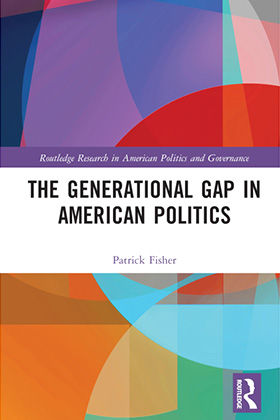Professor Patrick Fisher Examines Changing Generational Politics in New Book
Wednesday, March 6, 2024

Professor Patrick Fisher.
When he began researching the history of the generational gap in American politics, Professor Patrick Fisher, Ph.D., posited that the political environment in effect as one comes of age continues to influence our political attitudes for the rest of our lives. The findings of his explorations of generational politics reinforce this idea, exacerbated more recently by what he calls "the remarkable contemporary [generation] gap."
In his new book, The Generational Gap in American Politics (Routledge 2023), Fisher takes a deep analytic dive into the voting landscape, using data from sources like the American National Election Studies (ANES), 2020 National Election Pool, A.P VoteCast, and the Pew Research Center.
"My primary data source is the American National Elections Studies (ANES) which is a survey conducted by the University of Michigan and Stanford University every presidential election year," shares Fisher. "ANES has been conducting its surveys since 1948, and age has always been a question asked, so it provides a mechanism to look at how generational politics has ebbed and flowed over time." His research was unique. "Empirically comparing generational politics going back this far had actually not been done before," he said.
Born during Generation X, with Baby Boomer parents, Fisher has a distinct recollection of being interested in politics and history since first grade. His first political memory was watching presidential election returns with his parents when he was 6 years old, he notes, and this began an ongoing interest in how different generations adopt the political leanings of their times. The latter, he found, were markedly different between the Millennial Generation and Generation Z and older generations.
"Millennials and Gen Zers have developed distinct political leanings that are significantly to the left of older generations," shares Fisher. "It is evident that Millennials have emerged as a generation that identifies itself as both considerably more liberal ideologically and more Democratic in terms of partisanship than the rest of the contemporary American population, and in Generation Z’s first presidential election they have followed in the Millennials footsteps"

Book Cover of The Generational Gap in American Politics.
In The Generational Gap in American Politics, Fisher parses voting and politically ideological data from the Greatest Generation through Generation Z, the most recent generation to reach voting age. Called "An intuitive and accessible treatment of generational politics" by Joseph Phillips of the University of Kent, the book appeals to both a scholarly and public audience interested in American politics and political behavior, trends, and norms. It was born of an intellectual curiosity Fisher developed. "I had a feeling teaching my courses that Millennials might be different politically and I began to analyze data to see if that was indeed the case. It was."
Fisher explained that because generational politics since 1952 had not been comprehensively studied before, "The Generational Gap in American Politics is a work on American political behavior that is intended to appeal to a scholarly and public audience interested in the generational dynamics of the contemporary American politics and culture."
A professor of political science in the Department of Political Science and Public Affairs at Seton Hall University since 2004, Fisher teaches, among other courses, Congress, Presidency, U.S. Elections, and U.S. Political Behavior. Fisher is also the author of Insufficient Representation: The Disconnect between Congress and Its Citizens (Lexington 2018), Demographic Gaps in American Political Behavior (Westview 2014), The Politics of Taxing and Spending (Lynne Rienner 2009) and Congressional Budgeting: A Representational Perspective (University Press of America 2005).
With an upcoming presidential election to observe, Fisher is eager to see what his research on newer versus older voters will yield. "Ever since the Millennials entered the electorate in 2004, younger Americans have been significantly more Democratic than older voters," he reiterated. "But polling throughout the Biden administration has consistently indicated that he is very unpopular among Generation Z."
What might this lower "Q-Rating" by Generation Z for the President yield in outcomes, and long-term data? "If Generation Z abandons the Democrats, it could turn out to be a very different generation politically from Millennials…Demographically, politically, economically, socially, and technologically, the generations are more different from each other now than at any time in living memory."
Categories: Arts and Culture






